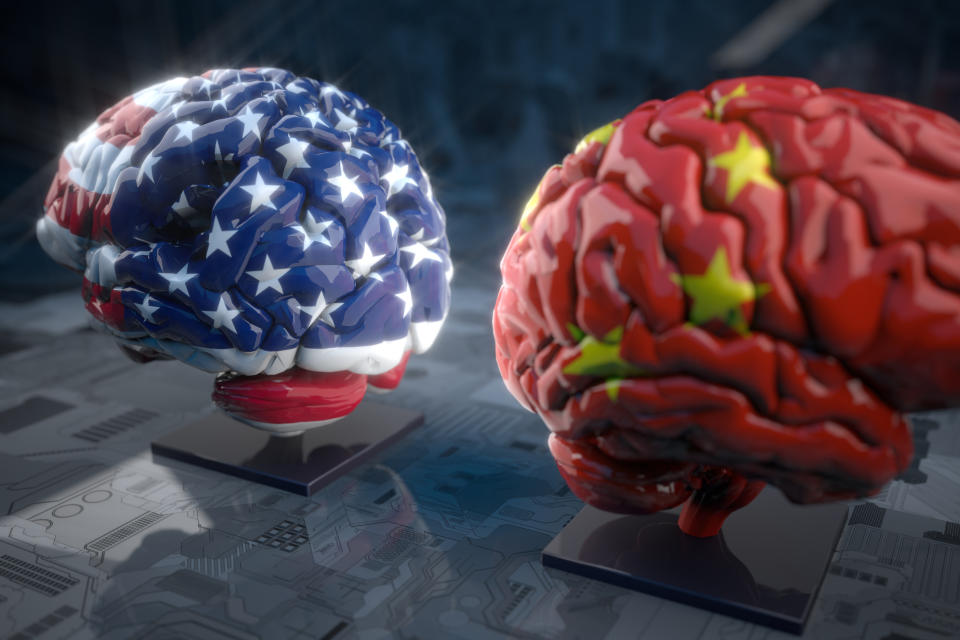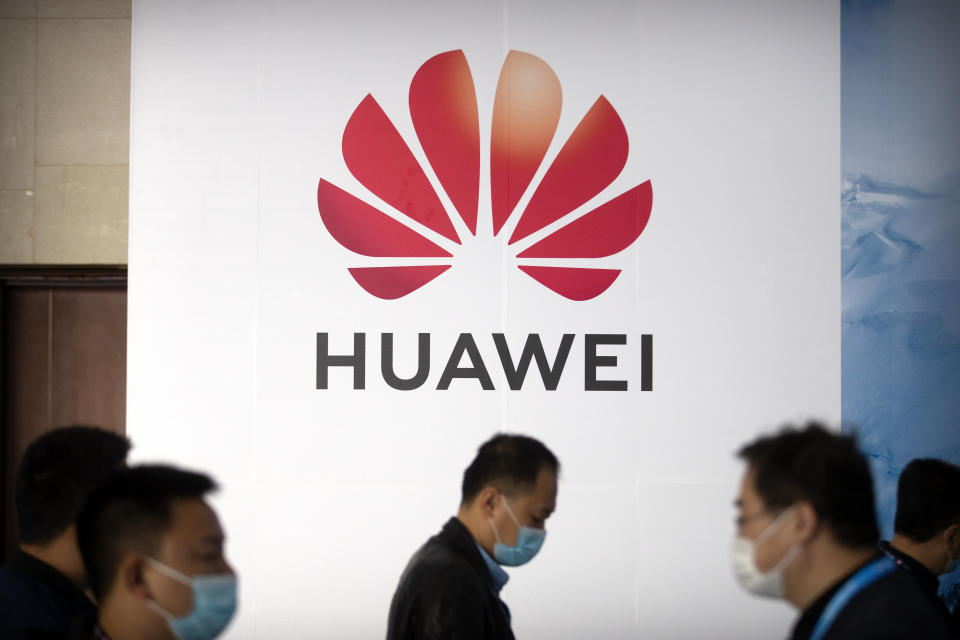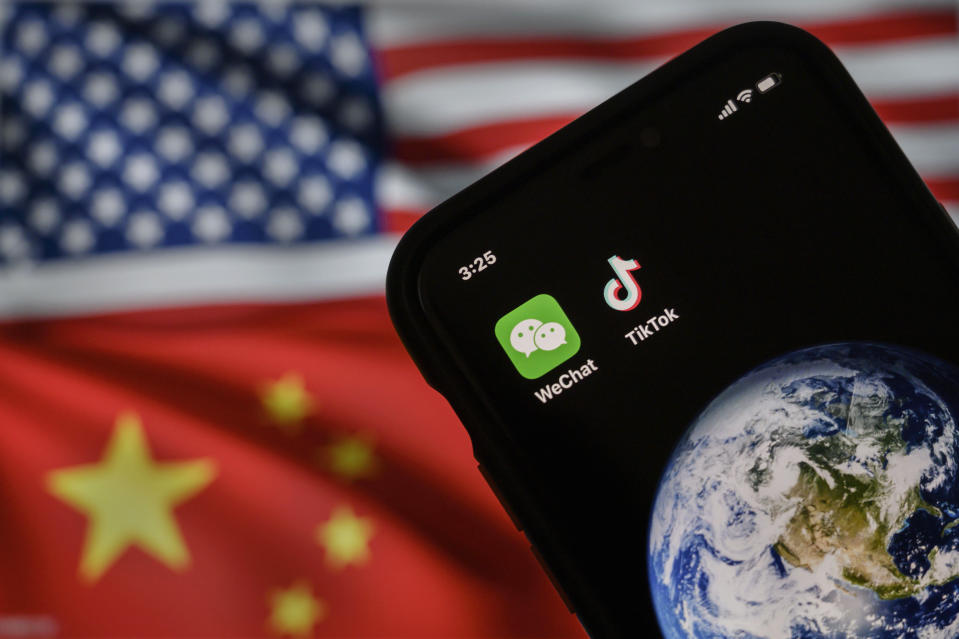Here comes the new US-China Digital Cold War
One of the top priorities President-elect Joe Biden will have to tackle—right after COVID-19 and shoring up the economy—is our relationship with China, (which of course figures in those two issues as well.) The U.S.-China relationship re-emerged this past week and I suspect will continue to do so as we move towards Inauguration Day.
It was a central tenet of Trumpism that China was demonized and blamed for our economic and societal woes—everything from job losses and trade deficits to fentanyl—and of course the COVID-19 pandemic too. And guess what? In some respects President Donald Trump was spot on, but he so conflated these truths with hyperbole and falsehoods that he undermined his own argument and as such gave ammunition to the Chinese.
Bottom line: Relations between the two biggest economies in the world are a mess right now. (Just this week Trump banned investments in Chinese companies he says do business with its military.) The question is what should Biden, (who late this week was belatedly congratulated by the Chinese for winning the election), do? We need a reset to be sure. But exactly how, and to what end?

One thing’s for sure, we’re never going back to where we were before with China, simply because the Chinese economy has nearly caught up with ours. Also it’s now the case that folks on both sides of the aisle agree that China plays by its own rules to our detriment and we need to call them on that, (one of those Trump truisms.) How we do that is where we disagree.
“The Chinese hawks want China to fail,” Silicon Valley VC and entrepreneur Reid Hoffman said to me this week. “But China is an important part of the global economy. If China fails, we all fail. Bridge building is really important, while still, of course, fiercely competing, and making sure that China plays its fair and just role on the world stage and doesn't pretend it's an emerging economy anymore, and isn't allowed IP theft. We have to have a collective set of rules that we all play together that allow the world to progress.”
A few points to pull out there. First regarding Hoffman’s “collective set of rules.” If Trump was the ultimate bilateralist, Washington watchers agree that Biden will almost certainly revert to traditional multilateralism. That means he will likely work with China as part of a group, along with say APAC allies like Japan, Australia and Korea, perhaps by rejoining the Trans-Pacific Partnership (TPP), which the U.S. quit in 2017 and of which China is not a member.
But the second bigger point which I really want to expand upon is when Hoffman says “fiercely competing.”
Oh indeed.
Simply put, this economic tug-of-war between the U.S. and China will be the defining geopolitical mega-trend of our lifetime. And that rivalry, (and rivalry is the perfect word for our relationship), for global hegemony, will take place primarily on one virtual battlefield, that being the business of technology, writ large.
Welcome then, to the new Digital Cold War.
Think back to the last time the U.S. was engaged in a bilateral rivalry like this. It was with Russia during the (original) Cold War, which began the day the Axis powers surrendered in 1945 and ended with the fall of the Berlin Wall in November 1989.
Just to delve into that Cold War for a minute. The reason it was called cold of course is because it never really got hot, i.e., the Americans and Russians never fought any direct battles. But that’s a bit misleading. Both sides spent trillions of dollars on weaponry, including vast nuclear arsenals, (nevermind the space race), countless KGB and CIA operations (check out the Safari Club, Air America and Operation Valuable Fiend) and proxy wars fought on every continent. Try telling the family of one of the 58,318 Americans killed in Vietnam that the Cold War was never actually fought.
Sadly and perhaps predictably, many are now of the view that all of this death and expenditure was for naught. The Soviet Union wasn’t defeated because of military action, covert or otherwise, rather it was the free economy of the West, in particular that of the U.S., that was responsible for capitalism’s triumph over communism.
As for this next conflict, it will not be fought and won with guns and bullets or god forbid nuclear warheads, but instead by which party dominates the businesses of semiconductors, AI, 5G, networks—and the cybersecurity that protects it all. Certainly there will be other players besides the U.S. and China, but mostly they will be customers or surrogates, beholden to the Big Two for these core products and services.
None of this is lost on the Chinese who are building a national policy based very much on this thinking. Neither is it lost on in-the-know Americans. The problem is that we are much less organized and coordinated than the Chinese, never mind going bumpily from Trump to Biden.
Here’s where things stand in these early days of this Digital Cold War.
Though the Obama administration was initially not so worried about the threat of Chinese technology (and indeed the signs were less clear then), by the second term that began to change.
Let’s use the Chinese telecommunications giant Huawei, now embattled with the Trump administration, as a case study.
“Huawei concerns started with national security people in the Obama administration,” says Ho-Fung Hung, a professor of political economy at Johns Hopkins and the author of “The China Boom: Why China Will Not Rule the World.” “The White House and Congress did an investigation in 2013 and found Huawei was a big cybersecurity threat.”

Concerns about the company stepped up once Trump became president. Huawei, among other items, makes a key product called radio access networks, (or RANs) the part of a telecommunications system that connects phones to telco networks through radio connections including base stations, antennas, chips and controllers. Besides Huawei, the RAN business, (which is about $76 billion in annual sales,) is dominated by Samsung (Korean), Ericsson (Swedish), Nokia (Finnish) and ZTE (also Chinese and also at loggerheads with the U.S. government.)
The Trump administration at first began telling allies in Europe that buying Huawei technology posed a national security risk, though with no hard evidence. That gained little traction. “The message was ‘trust us,’ but that is not a strong suit from this administration,” says an industry source. But what if the argument was framed in terms of economics, this source continued. If Huawei and ZTE gain more and more market share then the non-Chinese suppliers, which like all companies in the sectors need to spend billions of dollars of capital expenditure each year, might be forced to drop out of the business. “If that happened wouldn’t the inevitable outcome mean being wholly reliant on the Chinese?” the source asks. This argument gained traction in April when Europeans complained about the quality of PPE the Chinese were sending over, resulting in the Chinese slowing those shipments in apparent retaliation.
“Trump’s early approach was to bully and threaten U.S. allies like Germany and the UK to abandon Huawei,” says Ho-Fung Hung. “It didn’t quite work. “The Biden administration would talk to allies and persuade them to ditch Huawei...[in] a multilateral approach.”
And of course RANs are just one piece of the puzzle. Expanding market share in businesses like semiconductors and AI is also a strategic imperative for the Chinese government as part of its Belt and Road and Made in China 2025 initiatives, aimed at producing economic growth and providing national security.
‘An economic race and a security race’
U.S. national security experts increasingly see the Chinese modus operandi is to go to developing countries and offer a bundle of aid, investment and packages, including infrastructure projects like ports and highway systems, but now along with 5G networks even national security facial recognition systems. Consider the potential here to create quasi-vassal states that knowingly or unknowingly source data and intelligence back to China.
And when the Trump administration has blocked the export of U.S. tech to China, the Chinese have responded maybe not the way Trump anticipated. “Rather than confront any U.S. restrictions, what they’ve basically done is make stronger efforts to try to reduce reliance on imported technologies, particularly U.S. ones. That seems to be part of the broader multi-year strategy that they’re implementing,” says Bruce Kasman, chief economist and managing director of global research at JPMorgan Chase.
“We’re in a race with an adversary; an economic race and a security race,” says William Reinsch, a trade expert at the Center for Strategic and International Studies who served in the Clinton administration. “There are two ways to win a race: run faster or trip the other guy. Export controls are about tripping the other guy and getting in the way of what they want to do. There’s a place for that. But the more important option is running faster — making sure we stay ahead of them technologically. This will be hard to implement going forward because the Chinese have spent enormous amounts of money and consistently achieved technology goals faster than any expected.”
Now consider the consumer technology front in this conflict, which has shifted rapidly. Earlier generations of U.S. consumer tech made inroads in China. Microsoft’s suite of products (Word, Excel, PowerPoint, etc.) for instance are widely available in China. Same for Apple’s laptops, (Dell too), and remember Lenovo bought IBM’s PC business. But the Chinese made the environment tougher for the next crop of companies. Google introduced its search engine to China in 2006, but abruptly left four years later after being hacked and “disputes over censorship of search results,” (though the company still has a footprint in the country as versions of its Android operating system power a majority of China’s phones.) But as for the newer social networks; Facebook, Twitter, Snap, Pinterest? Forget it. They’re banned in China. (The business network, LinkedIn, now owned by Microsoft, being an exception.)
And that was the status quo—until the Chinese social media platform TikTok took America by storm starting two years ago.
“From the perspective of many Silicon Valley companies, the China market has been closed to them, but there wasn’t too much concern,” says Rui Ma, a San Francisco-based host of a podcast called Tech Buzz China. “Until TikTok, which caused a growing alarm. ‘Hey, before we were these two separate worlds. Now they’re starting to collide. Why is a Chinese company able to operate here, and be number one in its category?’ If there’s no fairness or equitable access to the markets, there’s this fear we might get crushed. It’s patently unfair.”
And the Trump administration has moved to ban TikTok, which now has 80 million-plus monthly active users in the U.S. A key bone of contention here: Money, money, money.
“The payment system associated with the apps—that’s the main concern,” says Ho-Fung Hung. “There’s a vested interest at Facebook and other U.S. tech companies to limit [Chinese messaging app] WeChat and TikTok expansion into electronic payment systems. The U.S. government may try to restrict and contain this expansion. The ability to launch a mobile payment system might be put in check by the new administration.”

Payments is very much in the news, as China President Xi Jinping himself reportedly scotched the IPO of Ant, (which is a part of Chinese platform behemoth Alibaba), after clashing with its charismatic and Western-facing billionaire founder Jack Ma, who raised hackles in late October when he stated there was “‘outdated supervision’ of financial regulation [which stifled] innovation and said Chinese banks operated with a ‘pawnshop mentality.’”
I asked Alibaba President Michael Evans about Ant’s IPO—which at that point was only on hold—and news of a greater regulatory crackdown this past week. “I don't know if I would use the term ‘regulatory crackdown,’” Evans said. “What Ant has experienced is quite typical of what you would experience in the world, which in an industry, financial services, the key is we need to be in close collaboration with the regulator.”
Initially Evans’ comment smacked of simply kowtowing to Chinese officials, and I still say he’s glossing some, but then I considered what U.S. tech companies face with regard to European regulators and increasingly here in the U.S. Our national bipartisan discontent, love-hate affair with Big Tech now plays out in Zoom confrontations between the likes of Mark Zuckerberg, Sheryl Sandberg, Jack Dorsey and Sundar Pichai versus indignant, ill-informed senators and Congressmen.
There is no doubt the scrutiny and incipient regulatory efforts will be taken up by the Biden administration. The real dilemma for Biden is how to rein in Big Tech, but not so much that it can’t compete with the Chinese. “That’s the biggest and most complicated question of all,” says Reinsch. “Personally, I think there’s a real risk that a too far-reaching approach on the Big Tech antitrust side could end up compromising their abilities to further innovate.”
“China will be building more and more of the technology platforms that matter in the coming years,” says Hoffman. “What that means is you don't disable your own player, right? What you want to do is you want to shape them. But the classic notion of an antitrust or breakup, I think those are generally speaking going to be actually, in fact, a counter to American health and prosperity.”
If Trump was right about the diagnosis when it came to China (it’s not playing fair), but not so much about the remedy (trade war), then how should Biden proceed? First, in a way he has air cover from Trump, because Biden can tone down the rhetoric, be more diplomatic and unwind the trade war, but at the same time stay just as tough in the tech sector. Second, Biden now has the backing of U.S. businesses to move aggressively on tech issues like IP protection and security. From 2000 to say 2015, businesses wanted the U.S. government to tread lightly so as not to upset the Chinese who held out the promise of open markets. Now in many cases, that’s seen as a fool’s errand. It’s as if the Chinese are holding up a shiny toy that U.S. companies can never grasp. Getting other nations to confront China along with the U.S. will be key for Biden.
So once the U.S. is post-COVID (which is how Evans described the Chinese economy to me) and we restore our economy, this battle for tech supremacy will become the main event. It’s a struggle which will inform the future of all business—banking, medical (vaccines and biotech), transportation, agriculture and energy.
But more than that, this is a rivalry which will define societies; education, culture, the military, and in the end personal freedom and responsibility.
Though algorithm-worshiping technologists in both China and America might disagree, in the end it will come down to a common set of humanistic values and making ethical decisions.
It’s no overstatement to say the future of humanity depends on that.
This article was featured in a Saturday edition of the Morning Brief on November 14, 2020. Get the Morning Brief sent directly to your inbox every Monday to Friday by 6:30 a.m. ET. Subscribe
Andy Serwer is editor-in-chief of Yahoo Finance. Follow him on Twitter: @serwer.
Follow Yahoo Finance on Twitter, Facebook, Instagram, Flipboard, SmartNews, LinkedIn, YouTube, and reddit.
Find live stock market quotes and the latest business and finance news
For tutorials and information on investing and trading stocks, check out Cashay